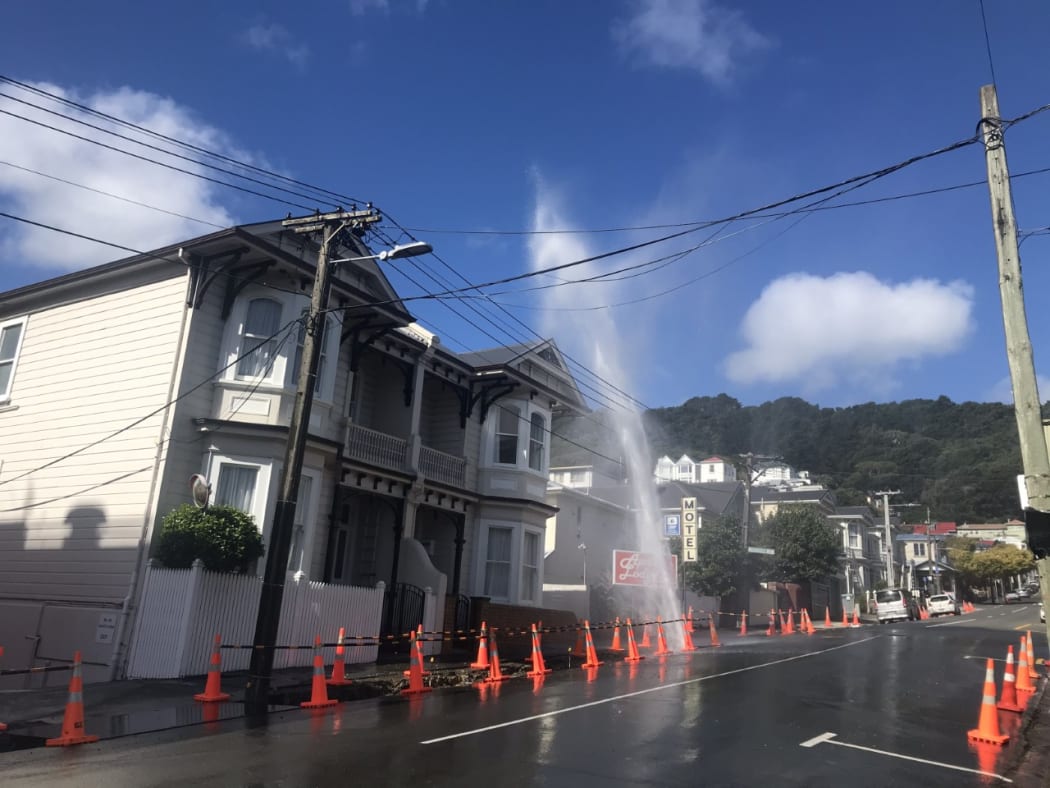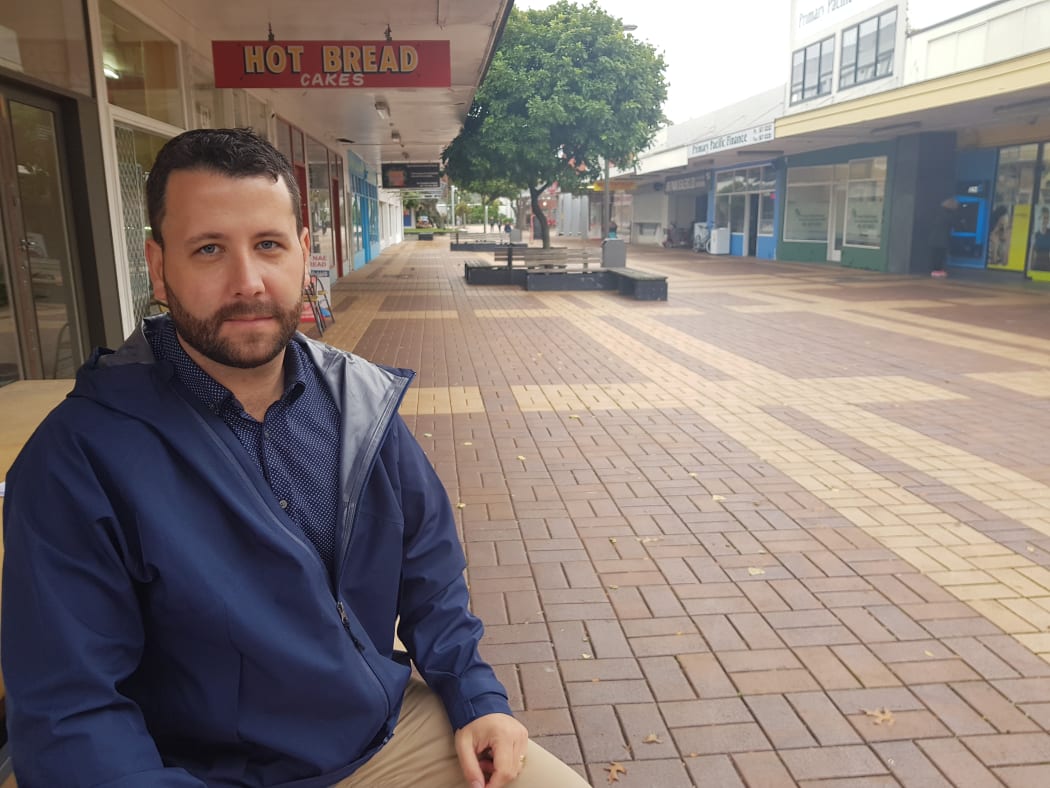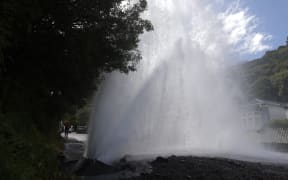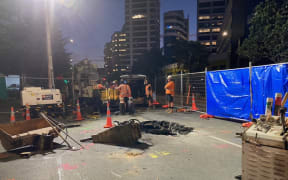Audit New Zealand is warning councils in the Wellington region of the risks and uncertainty of spending big on water infrastructure.

A burst pipe in Mount Victoria, Wellington, in early March. Photo: RNZ / Rachel Thomas
Worries over the condition and the age of the pipes, and the need to plan for population growth, has led to most of the territorial authorities to ramp up investment.
But concerning Audit New Zealand, and many within the industry, is whether the local contracting sector is able to actually deliver.
What's the problem?
When Campbell Barry became mayor of Lower Hutt in 2019, he quickly realised the city's water pipes had a trifecta of problems.
"An underinvestment over a number of decades; ageing infrastructure coming home to roost; and also the growth that we're seeing in the city as well," Barry said.
"Those three issues are really colliding together to make a situation where we need to act now with our investment and our focus."
It's something their neighbours in Wellington have been well accustomed to - sewage pipes frequently bursting and geysers occasionally erupting.
But the occurrences have led to all the councils having a think about their own water infrastructure.

Campbell Barry. Photo: RNZ / Emma Hatton
What are they doing about the problem?
In its Long-Term Plan, which will be finalised and put out for consultation this Wednesday, Hutt City is proposing to more than quadruple its spending on water infrastructure renewals, and double capital investment.
But they're not the only ones.
"Speaking to other mayors in the region," Barry said, "and the obvious challenges that Wellington City are facing with some high profile breakages, it means there is a clear focus in this space."
Wellington City is looking to invest $2.7 billion in water over the next 10 years and its capital expenditure programme is a third more expensive than previously budgeted for.
Elsewhere, Porirua is budgeting to spend $1.1bn over the decade.
And 32 cents for every dollar spent by Upper Hutt City Council will be going towards Three Waters.
What's the problem with what they're doing about the problem?
But there is a big question underlying all of these big money commitments: is the local contractor sector actually capable of doing the work?
Audit New Zealand - in their review of council's long term plans - has issued such a warning.
In their opinion provided to Hutt City Council, which has not yet been signed off by the council, they wrote: "The Council is proposing a significant increase in its capital programme by doubling its spend compared to the previous long-term plan.
"While the Council has put in place a number of initiatives, there is an inherent level of uncertainty and risk that the Council may not be able to deliver on the programme, especially when it has increased substantially.
"The Council notes the potential impacts of not achieving the capital programme, such as not meeting planned levels of service, or greater costs in the long term."
Auditors have provided similar warnings to the region's other councils, although they have not yet submitted their finalised opinion to Wellington City. That will be done this Wednesday.
Everyone agrees it's a problem
But no one has disagreed with the auditors' assertions.
Barry is a newly-elected member to the region's Water Committee, and has also been put onto the Steering Committee for the Three Water reforms.
"It is, in my view, the number one challenge we are going to have," he said.
"That, alongside how we also deal with what will be reform in the Three Water sector, making sure that while all of that is going on, we are able to actually deliver on what we are putting into our Long-Term Plans."
Meanwhile, Wellington Water - who oversee the entire region's water network, and will be tasked with turning the money into better and more pipes - is also working on it.
Wellington Water manager of network development and delivery, Tonia Haskell, said: "It's something I'm worried about, and it's something our panel is worried about."
She was particularly worried about engineers, who were in short supply, and could only be brought in from overseas one by one.
"They're absolutely critical to every part of that chain, and particularly in that pre-construction phase around design," Haskell said.
"And then we also have engineers that look after the project, so there's an engineer to contract, and there's usually site engineers that are on hand to make sure the job is going well."
So what does an engineering shortage actually mean for how projects will be delivered?
"The risk that we're trying to manage there is that they slow up that pre-construction phase," Haskell said.
"Once they got underway, we can manage that by distributing resources around the region.
"But what we're finding at the moment, and the risk going forward, is that really intensive pre-construction phase, that is really critical to keeping the momentum of the project going."
As such, Wellington Water was also looking to trial some ways where it was less dependent on engineers.
A nationwide problem
This is not an issue just facing the Wellington region, and it is not an issue that is just facing contractors working in Three Waters.
Civil Contractors New Zealand chief executive Peter Silcock said: "Over the last few years, there has been real challenges around capability within the civil contracting industry".
"So we need to grow that capability and capacity."
Civil Contractors New Zealand has begun a marketing campaign to attract more people into the sector.
Silcock was hopeful that the signalled investment will give contractors the time and ability to scale up.
"If we're going to train people, we're going to employ people, if we're going to buy equipment, then we're going to need certainty of investment.
"And we're seeing a lot more of that coming through."
But another concern is that each sector will have to stave off competition from others.
"For instance, Waka Kotahi, they employ a lot of civil contractors as well, building roads, and cycleways etc. as well as Wellington Water employing a lot. So there's a degree of internal competition within a region."





